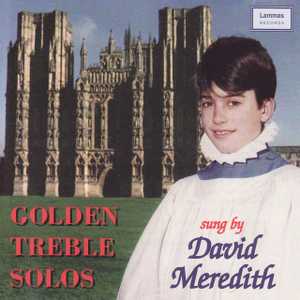Golden Treble Solos - David Meredith

David Meredith
The little road to Bethlehem Michael Head
The Lord's my Shepherd Jessie Irvine, harm. T C L Pritchard
Pie Jesu from the Requiem Gabriel Fauré
The Call Ralph Vaughan Williams
Agnus Dei from the Coronation Mass Wolfgang Amadeus Mozart
Jesu, joy of man's desiring Johann Sebastian Bach
The day thou gavest Clement Cotterill Scholefield
Ave verum corpus Wolfgang Amadeus Mozart
Sleep my baby Trad. Welsh arr. Malcolm Archer
Jerusalem Hubert Parry
Panis angelicus César Franck
Morning has broken Trad. Gaelic
Ave Maria J S Bach, adapted Charles Gounod
O for the wings of a dove Felix Mendelssohn
Dear Lord and Father of mankind Hubert Parry
Amazing Grace Trad. American arr. Malcolm Archer
Love one another Samuel Sebastian Wesley
A grateful heart Mary Plumstead
Total playing time 62m 00s
Golden Treble Solos - David Meredith
Golden Treble Solos
Golden Treble Solos
All of the works on this recording are musical gems which for one reason or another have earned an enduring place in the solo soprano repertory and which, through their exquisite crafting for the human voice are assured a lasting popularity. The composers are wide ranging and span several centuries from J.S.Bach to the present day.
Schubert's beautiful Ave Maria (RealAudio) is a prayer to the Virgin Mary, Hail Mary full of grace and is full of the composer's characteristic gift for melody which can be found in much of his music but most noticeably in his songs. Later in the recording the same words are set by Gounod, a Parisian composer who lived from 1818 to 1893. Michael Head was a twentieth century English composer who also had a great gift for melody. He was born in 1900 and was educated at the Royal Academy of Music where he later became Professor of piano. The Lord's my shepherd is one of the most popular hymns, especially when sung to the tune Crimond. The words are a metrical setting of Psalm 23.
Fauré's Pie Jesu is a movement from his timeless and ethereal Requiem Mass. Fauré had a very strong influence on many French composers of his time and Maurice Ravel was among his pupils. The Call comes from Vaughan Williams' Five Mystical Songs, and is a setting of words by George Herbert. Originally composed to be sung by a baritone; this works equally well when sung by a treble. Mozart's Agnus Dei comes from his Mass in C (the Coronation Mass). The translation of the Latin words is: O Lamb of God, that takest away the sins of the world, have mercy upon us. Bach's setting of Jesu, joy of man's desiring comes from his Cantata No. 147 and has become a favourite choice for weddings.
The day thou gavest Lord, is ended, is another hymn of durable popularity and is sung to the tune St Clement, composed by Clement Cotterill Scholefield. Mozart's Ave verum corpus (Hail, true body) is a communion motet, and its reflective nature and melodic appeal has ensured a place in the repertory of most liturgical choirs, as indeed has his setting of Laudate Dominum. The words Sleep my baby are set here to a traditional Welsh folk tune of haunting simplicity.
William Blake's powerful words for Jerusalem could never be separated from Hubert Parry's magnificent tune, and it has almost become our second National Anthem. Another of Parry's tunes (Repton) is sung to Dear Lord and Father of mankind, which was composed for his oratorio 'Judith'. Panis angelicus (Bread of angels) is another work which is suitable for the communion and is set to music by the Parisian composer César Franck, who had enormous influence on French composers in the late nineteenth and early twentieth centuries.
Of the other hymns included here, Morning has broken and Amazing grace both have a special place in the hearts of many people. The former is sung to an old Gaelic melody, and the latter has American origins and is based on an old Shaker tune. O for the wings of a dove (RealAudio) comes from Mendelssohn's anthem 'Hear my prayer' which has a 'tour-de-force' of a treble solo, and singing this solo is the secret desire of most choristers. Love one another comes from the longer anthem 'Blessed be the God and Father' by S S Wesley, who was organist at several English Cathedrals including Exeter, Hereford, Winchester and Gloucester. The disc ends with a charming setting of A grateful heart by the English song writer Mary Plumstead. This simple yet effective piece is dedicated to Angela and Brian Rayner Cook and is a setting of words by George Herbert.
David Meredith
David Meredith was born in Bristol on 23rd March 1982 and was raised in Bath where he attended St Stephen's Church of England Primary School. He started singing at the age of six, encouraged by his piano teacher, Sue Ferguson. In September 1990 he became a chorister at Wells Cathedral with Dr Anthony Crossland, eventually being appointed Head Chorister, a position which he held for two years.
He is a pupil at Wells Cathedral School and he plays the piano and percussion and is a member of the school orchestra.With Wells Cathedral Choir, David has sung many solos and has taken part in several broadcasts and recordings as well as concert tours to Belgium, France, Brazil, Germany and the USA. He is also a soloist on the CD 'The Gift of Christmas'. Apart from singing, his other interests include tennis, which he plays for the school, athletics and horse riding.